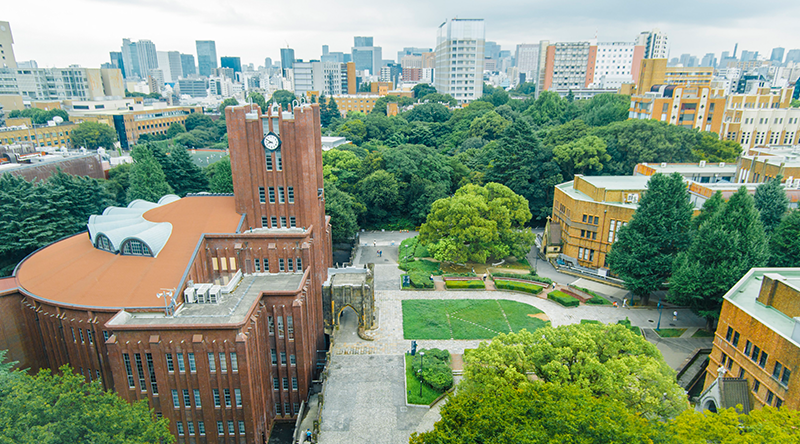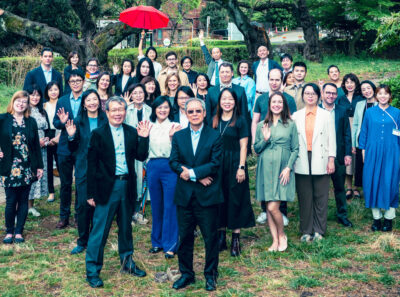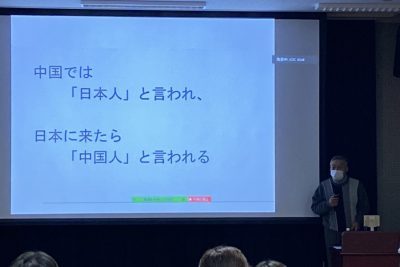Patriotism: What is it? And what is identity? – A response to a newspaper article

Patriotism: What is it? And what is identity?
- A response to a newspaper article
This essay was inspired by a newspaper article I happened to read at the beginning of my current stay in Tokyo. The article relates to “identity,” a subject that both Professor Haneda Masashi and I are interested in and which we both hope to discuss at Tokyo College.
Shūkan Dokushojin, a weekly publication specializing in book reviews, carried a long article in its January 10, 2020, first and second pages, consisting of a discussion between Professor Shogimen Takashi of the University of Otago, New Zealand, and Professor Uno Shigeki of the University of Tokyo. The title of the article was, “Shin no aikoku: nan no tame ni ikirunoka [True patriotism: What is our purpose in life?].” Two books by Shogimen published in Japanese in 2019 attracted significant attention: Aikoku no Kōzō [The structure of patriotism] published by Iwanami Shoten and Nihon Kokumin no Tame no Aikoku no Kyōkasho (Patriotism: The textbook for the Japanese nation), published by Hyakuman’nen Shobō. Shogimen saw that patriotism was taking on new life in Western academia as a political concept, and as a Japanese, he began to wonder how well this concept was really understood in Japan. Is patriotism an emotion that comes naturally to the Japanese people?
Japanese perceptions of patriotism over the past three decades of the Heisei era are perhaps best epitomized by Kyoto University Professor Emeritus Saeki Keishi’s Nihon no Aikokushin—Josetsuteki Kōsatsu (Japanese patriotism: An introductory study) and University of Tokyo Emeritus Professor Kang Sang-jung’s Aikoku no Sahō (The etiquette of patriotism). Shogimen undoubtedly wanted to take the discussion further. In responding to Uno’s questions, Shogimen was careful to draw upon British political thought to make a distinction, in particular between the theories of “nationalism” and “patriotism.”
I have not yet read Shogimen’s books, but I agree that both China and Japan should give more weight to the issue of patriotism. In my understanding patriotism can be a gentle, rational and legitimate emotion, but only on two conditions. First, it must be citizen-centered. People must have the conviction that they are central to the group, nation or ethnicity. Without a democratic system of political participation, the people cannot play a central role and will not feel true love for their country. Second, there must be freedom. Patriotism is meant to help a nation better itself. There must be room for both encouragement and criticism. There cannot be patriotism without legally protected freedom of speech. Unless these two conditions are met, the hoped-for rational patriotism may degenerate into blind nationalism.
I feel there is a vague connection between the publication of Shogimen’s books and the anti-globalism, the “my nation first” attitude, that is spreading through the world today. It has become clear in recent years that contrary to expectations, such things as globalization, the Internet, free trade, and universal values, have not diminished the importance of the nation-state. Not only have we not reached the “end of history,” we seem to have actually reverted to a condition in which the existence of the nation-state has become more pronounced than ever under the protective guise of certain kinds of political awareness and political systems. The result has been to make it more difficult than ever to cross national boundaries. Right now, countries around the world are being compelled to choose between universal values and national (national and ethnic) values. This, in turn, may be why people in academia and the world of ideas are reconsidering the meaning of “patriotism” and “identity.”
On February 4, a seminar on the topic of identity was held at Tokyo College. After Professor Haneda and I spoke on our respective views of identity, there was lively debate among the Tokyo College faculty and researchers attending the seminar. This is not surprising as “identity” is closely connected to “patriotism.”








